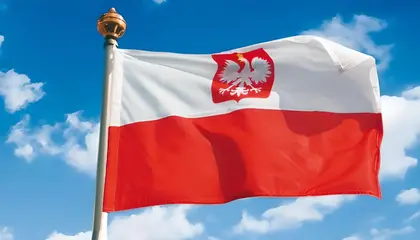Here are five things to know about Poland, a European Union and NATO member of 38 million people that is holding parliamentary elections on Sunday, Oct. 15.
- Rule of law -
JOIN US ON TELEGRAM
Follow our coverage of the war on the @Kyivpost_official.
The populist right-wing government in power since 2015 initiated an overhaul of Poland's judiciary citing the need to fight corruption. But the changes have drawn criticism from lawyers both within Poland and in the EU institutions concerned about Polish rule of law.
The PiS government has been accused of -- and condemned for -- hijacking the courts, the prosecutor general's office, the supreme court and the constitutional tribunal, as well as trying to limit the independence of judges.
The lingering rule of law concerns block Poland from getting its share of EU Covid recovery funds worth 35 billion euros ($38 billion).
- Migration -
Since Russia started its full-scale invasion of Ukraine, Poland has opened its border with the eastern neighbour and hosted millions of refugees fleeing the country.
According to the Polish border guard agency, some 16 million crossings to Poland from Ukraine have been registered since, with 14 million crossings in the opposite direction.
Around a million Ukrainian refugees currently reside in Poland, mostly women and children.
The situation is dramatically different on the border with Belarus, where Poland erected a fence to deter migrants, blaming Minsk for "hybrid attacks" and orchestrating the crisis.

Washington Responds to Russian Threats to Target US Base in Poland
Human rights organisations have accused the government in Warsaw of engaging in forceful pushbacks of migrants seeking to cross the border from Belarus illegally and refusing legitimate asylum claims.
- Military equipment -
Poland has been one of the major donors of military equipment to Ukraine and served as a transport hub for arms coming from its Western allies.
But as relations with Kyiv soured, Warsaw announced in September it would only carry out previously agreed deliveries of ammunition and armaments.
The Law and Justice government has at the same time continued its spending spree to boost its own army, signing multiple arm deals, mainly with the United States and South Korea.
Warsaw has also pledged to raise the military budget to more than four percent of its GDP in 2024 and is planning to build Europe's biggest land army by 2026.
- Climate woes -
Poland remains a heavily coal-dependent country -- more than 70 percent of its energy production is based on this fossil fuel -- and it continues to contest European climate goals.
Its massive Belchatow brown coal-fired power station is the EU's "single largest greenhouse gas emitter", according to environmental nonprofit Ember.
The Warsaw government took the first steps towards transition from coal in September when it signed a deal for the country's first nuclear power plant.
The first reactor is set to come online in 2033.
Poland plans to eventually have three nuclear power plants, each with three reactors, generating around 30 percent of its energy production.
- Catholic church -
Long considered a Catholic bastion of Europe, Poland is proving to be less and less so, with a more than 16 percentage point drop in people declaring themselves Catholic in the space of 10 years.
According to the latest national census of 2021, only 71.3 percent of Poles declared themselves Catholic, compared to 87.6 percent in 2011.
The once-powerful Catholic church is now facing a popularity crisis following a series of sexual abuse cases among priests and accusations of preferential treatment by the nationalist ruling party.
You can also highlight the text and press Ctrl + Enter






